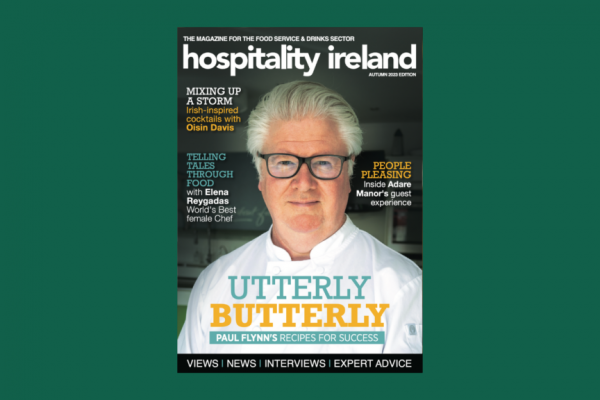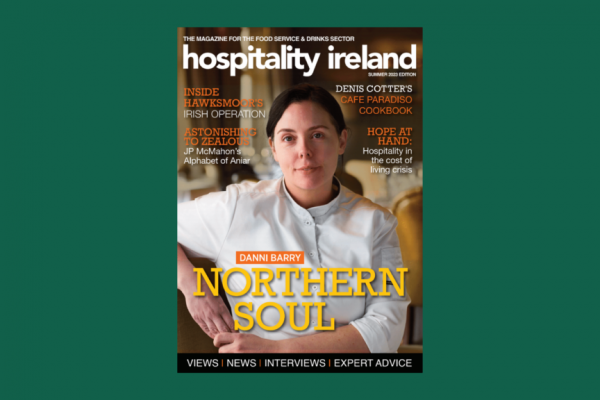The end of lockdown and consequent reopening of international travel has brought about a surge in recruitment in the tourism industry, but these jobs are proving hard to fill. Hospitality Ireland reports.
This article was originally published in the Autumn 2021 issue of Hospitality Ireland Magazine, in October of 2021.
If you want to test the market for hospitality employment, where better to begin than at the coalface of recruitment? A recent survey by jobs site Indeed.ie, which operates in over 60 countries and 28 languages, employing over 1,000 people in Ireland, had some interesting findings, recently released to mark UN World Tourism Day, on 27 September. Job postings containing keywords such as ‘tourism’ and ‘hospitality’ in Ireland more than doubled (+104%) as a proportion of total job postings in the three months to the end of August, compared to the lows of lockdowns in 2020. The recovery in hiring kicked off in May, which was the first month to show an increase (+87%) in recruitment after 15 consecutive months of decline.
While employers in the sector are searching for staff, the pace of recovery in demand for tourism/hospitality jobs is less rapid, which is consistent with reports that jobs are proving hard to fill. Searches for tourism-/hospitality-related roles were up 38% in the three months to the end of August, rising by only a third of the pace at which employers are increasing job posts. Earlier this month, Fáilte Ireland launched a campaign to attract jobseekers, stating that many tourism businesses have been unable to capitalise on the demand for their services due to staff shortages.
With inbound tourism effectively shut and domestic tourism severely curtailed, the pandemic has had a severe impact on a sector that accounts for 5% of GDP. Of the 110,700 people in receipt of Pandemic Unemployment Payments (PUP) as of 21 September, over 19,000 were in the hospitality/restaurant/food sector, down from a peak of 131,000 in May 2020.
Indeed’s recently published monthly Job Search Survey shows that care responsibilities, such as parenting, and fears about contracting Covid in the workplace are continuing to act as barriers to those without jobs and not in receipt of PUP returning to work.
The research also shows that PUP recipients have become much more active in their job searches, with the proportion of respondents in this category saying that they are urgently looking for a role rising from 13% in July to 36% in August. This increase comes as phased reductions in PUP payments kicked in during September.
Overall demand for labour has continued to rise, with job postings as of 10 September 2021 on Indeed Ireland 32.2% above the pre-pandemic baseline of 1 February 2020. With employers in a range of sectors, in addition to tourism/hospitality, encountering hiring bottlenecks, the supply of workers is struggling to keep pace.

Sean O’Driscoll
Recovery
Jack Kennedy, economist with Indeed, commented, “Tourism accounts for one in ten jobs worldwide and is a major source of employment due to its labour-intensive nature, so the recovery of the sector will play an important role in helping reduce unemployment levels in Ireland. The industry is the economic backbone of many rural communities and is particularly important for younger people, who will often use part-time roles to help them fund their studies.
“Our data paints a welcome picture of a sharp recovery in demand from employers as lockdown restrictions eased. It also shows that the level of demand from jobseekers has not rebounded at the same pace, explaining the acute staff shortages that we are hearing from those in the hotel, pub and restaurant trade. This is likely compounded by a dip in supply of workers from overseas, who often provide necessary support to the sector.
“For some, concern about exposure to Covid-19 remains a barrier to returning to work. A sustained period of reduced case numbers and hospitalisations, coupled with high vaccination rates, may help reassure this cohort that is holding back to avail of the large number of opportunities that are out there.
“The recovery in labour demand is being felt through the economy, with job postings over 30% ahead of prepandemic levels, and it is likely that other sectors of the economy, beyond tourism and hospitality, may also find roles challenging to fill.”
Trends
For Sean O’Driscoll, CEO of the iNua Collection, the trends and challenges identified by Indeed’s research are playing out in real time, so how is he finding staffing at the moment?
“Recruitment has been very challenging since the hotels reopened in June. The iNua Collection started a recruitment campaign in March, in advance of reopening. We were very fortunate to have 800 of our colleagues returning to work, but we still had 400 vacancies to fill. Unfortunately, the tourism and hospitality sector has lost upwards of 40% of its experienced talent during Covid. The second lockdown period was an eight-month closure for most hospitality businesses, and, understandably, many employees could not afford to wait around to see when hospitality would reopen again, and they found jobs in other industries.
“We did not have any issue with existing employees not returning to work because of the Pandemic Unemployment Payment, however, what we did notice was a reduced number of people seeking summer jobs. While the hotels are getting a little quieter from September onwards, we still have approximately 130 job vacancies across our nine hotels.”
What are the main challenges in this area right now?
“Pre-Covid, recruiting chefs was the big challenge. Now all positions are difficult to recruit – reception, bar and restaurant service, accommodation – and FEATURE the chef crisis has become much worse.”
What’s causing this, does O’Driscoll think?
“I think losing up to 40% of our experienced talent to other industries is the main factor. Hospitality employees found jobs in supermarkets, call centres, factories and hospitals during Covid. It has been a very frightening and uncertain time to work in hospitality during Covid, and there is no doubt that the prolonged closures have caused huge damage to the skill level in the industry that will take years to build back up. Also, many international workers did go home, and I’m not sure they plan to return to Ireland, particularly with the housing crisis and the high rents here.
“I think the Pandemic Unemployment Payment being the problem has got a lot of publicity, however, I think the problem is much greater than that. The hospitality industry will have to work hard to attract talent back.”
What has iNua done to address the challenge?
“While working from home is not an option for most roles in hospitality, we have looked at how we can offer flexibility to our colleagues to work around their personal life, whether it be supporting students so that they have all the time off they need for study, or supporting parents to work around their child-minding schedule. As we emerge out of Covid, looking after our health and mental health is very important. All our colleagues are members of the Laya Employee Assistance Programme, offering great advice and counselling to our colleagues and their families.

Careers
“The iNua Collection are very focused on supporting those who wish to make a career in hospitality. We have a threeyear trainee manager programme with Munster Technological University in Tralee. The students go to college for two blocks, in winter and spring, and get the opportunity to work in every department in the hotel over the three years. We have a similar programme for trainee chefs with the Limerick and Clare Education and Training Board.
“We looked at the barriers to people signing up for these courses and worked to eliminate them. For our colleagues taking part in hospitality college courses, the iNua Collection pays their college fees, pays them a salary to attend college, and provides them with free accommodation while attending college. We provide a manager to mentor and support the student through the course. As an industry, if we want to attract people to join it, we need to give every support, to ensure that person can succeed. We also offer a lot of short training courses, for those who want to develop their skills but may not want to commit to a college course.
“Recognition is also hugely important, and we have many recognition initiatives in our hotels. One of the most popular ones is Thank-You Thursdays, where we have a lunch with special treats, to thank colleagues for their hard work. Getting the basics right – in terms of employee meals, facilities, and recognition and rewards – is very important, and we invest a lot of time and resources in this.
“We also offer a recruitment bonus to colleagues who introduce a friend to apply for a role in the company. Our colleagues are our greatest ambassadors and have been a great support in helping us recruit.”
What are O’Driscoll’s expectations around staffing over the next year?
“We expect it to remain very challenging. It is going to take time to attract people back to the hospitality industry.”

Support
What does he think the government could be doing to support hospitality businesses in this regard?
“While it is government policy to continue to raise wage rates, there has been a lack of focus on addressing costof-living expenses, such as rent and energy costs. One of the main barriers to working in cities and tourist areas is the lack of availability of housing and accommodation to rent. Airbnb has taken a huge amount of the normal rental accommodation that employees used to avail of, meaning that there is no accommodation for people who work in cities, towns, and tourism hotspots. This is not sustainable tourism, where you have housing and apartments that did not receive planning as a tourism business now operating as a tourism business. It is not a positive thing for communities to not be able to accommodate people who work in towns to live in those towns. As well as the obvious need to build houses, the government needs to regulate the tourism accommodation sector properly, and to encourage the use of vacant properties.
“The government also needs to support tourism and hospitality education, and the promotion of careers in the sector. We need to promote tourism and hospitality education opportunities in Ireland internationally, and not just in Ireland. The government needs to make the availability of work permits for hospitality easier, as I fear, without international workers coming to Ireland, our tourism industry will not be able to rebuild and grow in the short term.”
What would O’Driscoll like to see happen over the next six to nine months?
“I would like to see substantial progress on the work permit issue, a clear strategy for tourism and hospitality education, and real progress on housing and rental accommodation.”
Finally, how is business, generally?
“We had a very strong summer period. We have been pleasantly surprised that business has also remained strong in September, however, we do expect leisure business to get much quieter from November onwards. Corporate travel business is only at approximately 30% of the norm, and international flights into Ireland are only at 50% of 2019 levels. I think the November-March period will be challenging for tourism and hospitality businesses, however, we would be confident that the sector will begin to recover as we approach Summer 2022.”
Read More: Hospitality Ireland Autumn 2021: Read The Latest Issue Online!








